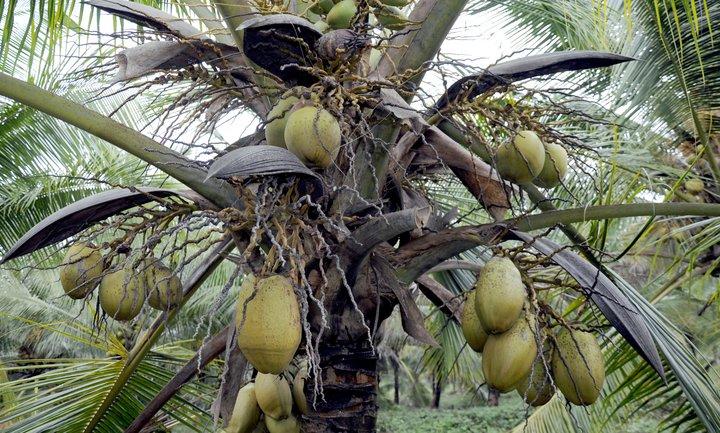Saving the Pacific’s coconuts

Government representatives from Fiji, Papua New Guinea and Samoa are meeting this week to launch a mission, coordinated by Bioversity International and COGENT, to protect Pacific coconut diversity from climate change and other threats.
Government representatives from Fiji, Papua New Guinea and Samoa are meeting in Lautoka, Fiji, this week with other Asia-Pacific and international stakeholders to launch a mission to help protect Pacific coconut diversity and associated livelihoods from climate change and other threats. The mission will be coordinated by Bioversity International and COGENT.
Coconut is an important livelihood and food security crop for more than 10 million farmers who cultivate coconut palms worldwide on around 12 million ha, as well as for tens of millions more households who own a few coconut palms. Bioversity International hosts the International Coconut Genetic Resources Network (COGENT), which has 40 country members representing 98% of global production (with 80% produced in Asia).
COGENT will hold the inception workshop between 14 and 17 June, in conjunction with the Pacific Community (SPC). Along with main partners and other stakeholders* the workshop will launch a new 3-year Darwin Initiative-funded project ‘Upgrading and broadening the new South-Pacific International Coconut Genebank’ starting 1 June 2016. These genetic resources urgently need conserving for current and future well-being.
A new International Coconut Genebank is to be established in Papua New Guinea, where the existing South Pacific International Coconut Genebank is threatened by a lethal yellowing disease, Bogia Syndrome. Importantly, not all representative coconut biodiversity is conserved, and in many Pacific islands, this is seriously threatened by climate change and potential sea-level rise and soil salinization.
A proposed transfer of the South Pacific International Coconut Genebank, partly supported by the Government of Papua New Guinea, from Madang to Punipuni, with a duplication back-up planned in Fiji and Samoa, is a unique opportunity to collect and protect endangered cultivars. The project will amend the current list of coconut varieties held in the genebank with new varieties coming from other Pacific countries.
Selection of new varieties will be based on several validated criteria. A partner-panel of experts from international, regional and local organizations will collaborate to identify the most threatened coconut varieties on habitat loss during the next 40 years. A zone of ‘most-endangered areas’ will be established and, explored for identification and characterization of unknown or “orphan” coconut varieties. Other criteria such as uses, and resistance to cyclones or diseases will also be considered. The identified and selected varieties will then be safely moved if possible to Papua New Guinea, or to the Fijian or Samoan sites.
This project will also help in training young scientists in coconut breeding and conservation, and upgrading the capacity of the genebanks’ staff. All the collected data will be registered under the Coconut Genetic Resources Database to be available for the international research community and all coconut stakeholders through COGENT facilities.
_____________________
*The workshop will gather the main project partners: the Asia and Pacific Coconut Community (APCC); COGENT/Bioversity International (Coordinator of the project); the curator of the South Pacific International Coconut Genebank (ICG-SP) hosted by the Cocoa Coconut Institute (CCI) in Papua New Guinea; the Centre de coopération Internationale en Recherche Agronomique pour le Développement (CIRAD); the Global Crop Diversity Trust (GCDT); Government relevant ministries from Fiji, Papua New Guinea (represented by Kokonas Indastri Korporesen, KIK) and Samoa; and the Pacific Community (SPC). Invited delegates also include representatives from: the Australian Centre for International Research (ACIAR- Pacific region); the UN Food and Agriculture Organization (FAO) Sub-regional Office; the regional focal points for the Convention on Biological Diversity (CBD), and for the International Treaty on Plant Genetic Resources for Food and Agriculture (ITPGRFA, The Treaty)
The 3-year project is funded by the Darwin Initiative, a UK government grants scheme helps to locally protect biodiversity and the natural environment worldwide. It is also part-funded through the CGIAR Research Program on Forests, Trees and Agroforestry.
Photo: Coconut palm tree, Sri Lanka. Credit: Bioversity International/D.Martinez
For information contact:
Dr Alexia Prades, COGENT coordinator
Bioversity International
Email: [email protected]
